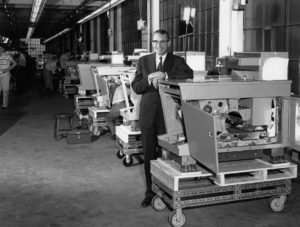The great inventions in the sector of printing and photocopy have made our lives much easier. Think about a world where we needed to pay a few dollars just for one colour print, absolutely not affordable right? Given that photocopy is essential in every sector starting from an educational institution to a corporate company and even a hospital, it had to be made pocket-friendly. And, with the inventions made by Xerox Corporation, especially Joseph C. Wilson the industry of photocopying will not be dealt with casualties at least for the next century.
Xerox Corporation, a multinational conglomerate pioneering in the world of the printing industry was founded more than a century ago in 1906. The company then was established as The Haloid Photographic Company, and the three masterminds behind this mammoth transforming setup were Joseph C. Wilson, Chester Carlson, and Jeff Leonard. Let’s have a detailed look into the life of Wilson, and his inventions, and how it led to founding Xerox.
Life of Wilson
Born in 1909 to J.R. Wilson and Kate Wilson, Wilson spent his childhood in Rochester. During his early childhood, Wilson grew a love for literature in his heart. He completed his high school from West High School, Rochester and pursued economics in the University of Rochester. Later, he went to Harvard to complete his MBA. After getting his business degree, he joined Haloid and became the head of the company.
History of Xerox Corporation

Xerox was founded on 18 April 1906 as Haloid. During this time, Carlson worked independently on his innovation that revolved around printing images. He was a very promising physicist, and Wilson after taking over the company from his father showed keen interest to work with Carlson’s product. And all of these happened during the time of the Second World War, which added up mostly to the sale of photographic papers for government work. Though the photographic papers were in demand, Wilson had strong competitors, too. So, he needed to come up with an excellent idea at the earliest hour to save Haloid from dissolving.
Wilson wanted to launch a new product called Xerox 914, which had Carlson’s technology incorporated in it. It took Carlson almost two decades to perfect the technology, and finally, it was released in 1959. The product brought a revolution in the industry, resulting in $60 million revenue of Xerox at the end of 1961, which escalated to $500 million by 1965. The technology that was used in the product was Electro-photography, and Wilson gave it a new term called “xerography’.
That is how Haloid came into the spotlight, and its most important goal was to make photocopying easier and cheaper for the world.
Wilson’s Idea Flooded the Company with Profits
A year after the launch of 914, Wilson Center for Research and Technology was established in Webster, New York, and the following years, the company was enlisted on the New York Stock Exchange as Xerox (XRX). In this year, the company’s earnings grew to 151%.
In 1969, another invention followed. It was a laser printer, Xerox 9700 and brought billions of dollars of business to the company. Once the company settled on firm grounds, it made multiple acquisitions, including University Microfilms International, Scientific Data Systems, Electro-Optical Systems, etc. Even after Wilson’s death in the early 1970s, the company is still embarking with new technologies, acquiring gigantic businesses and making great innovations. In 1970, Xerox Palo Alto Research Center was developed, and it started developing modern technologies like graphical user interface and laser printing.
With the advent of a new decade, a new century and a millennium, Xerox started the year 2000 with a big acquisition of Tektronix colour printing for $925 million. This was followed by further acquisitions of companies like XMPie (software provider) and Newfield IT.
Currently, Xerox Corporation is a major part of the IT industry with its headquarters based in Norwalk, Connecticut, New York. The products of Xerox include printers, scanners, projectors and other office equipment. With John Visentin as the Vice Chairman and the 10th CEO of the company, around 35,000 people are working together to find more efficient equipment for the near future. Today, Xerox has become a significant brand name both in research and development and marketing.

Annasha Dey is an NIT student, who apart from studying engineering is also a content writer. She has a great interest in photography, writing, reading novels, and travelling as well. She is a foodie who loves socializing and hanging out with her friends. She is also a trained Kathak dancer and a big fashion enthusiast. Dey also loves watching TV series, which includes F.R.I.E.N.D.S. and Big Bang Theory. To be a better writer she prefers to read more
